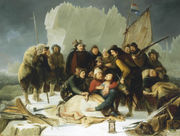Willem Barents
2007 Schools Wikipedia Selection. Related subjects: Geographers and explorers
Willem Barents (Dutch: Barentsz; born ? 1550 in Terschelling, West Frisian Islands, Netherlands; died June 20, 1597 in Novaya Zemlya, Russia) was a Dutch navigator and explorer, a leader of early expeditions to the far north.
In 1594 he left Amsterdam with two ships to search for the Northeast passage north of Siberia and on to eastern Asia. He reached the west coast of Novaya Zemlya, and followed it northward, being finally forced to turn back when near its northern extremity.
In the following year, he commanded another expedition of seven ships, which made for the strait between the Siberian coast and Vaygach Island, but he was too late to find open water. His third journey also failed and resulted in his death. On this occasion he had two ships, captained by Jan Rijp and Jacob van Heemskerk. On the outward journey they sighted Bear Island and Svalbard (also known as Spitsbergen), where the ships were separated. Barents' vessel, captained by Heemskerk, was trapped in the ice after rounding the north of Novaya Zemlya, and the crew was compelled to winter on Novaya Zemlya, tearing apart their ship's superstructure and spare timber to build a lodge. Since the ship was not released from the ice early in 1597, Barents' party left her in two open boats on June 13, and most of the crew escaped, being picked up by Jan Rijp's ship at Kola Peninsula near Murmansk. Barents himself, however, died on June 20.
The tale of the terrible winter spent on Novaya Zemlya was published as the diary of Gerrit de Veer, the ship's carpenter, who was the first person to observe the atmospheric anomaly known as the Novaya Zemlya effect.
In 1871, the house where Barents and his crew wintered was discovered undisturbed, with many relics, which are preserved at The Hague; and in 1875, part of his original journal was found.
The Barents Sea and Barents Region were both named after him.

